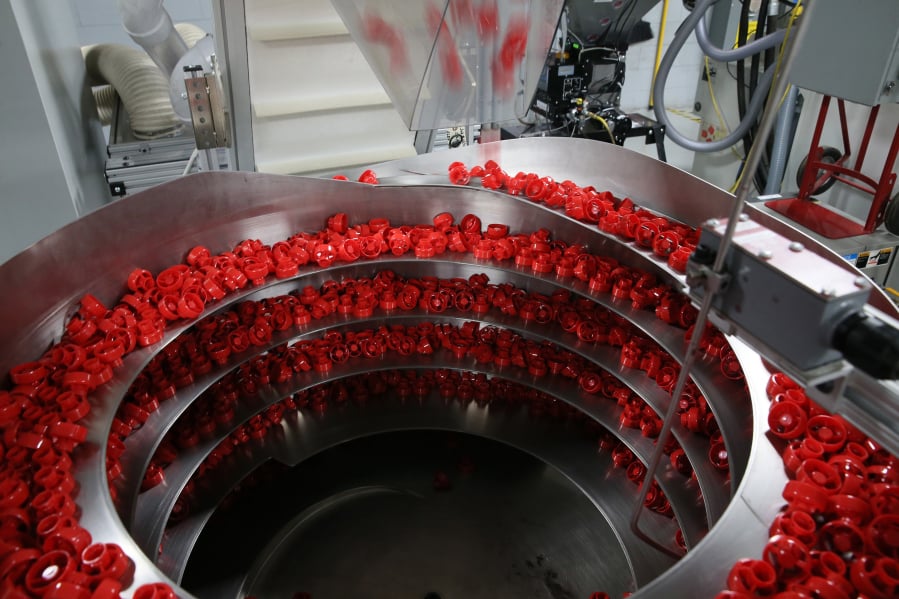With China and the United States embroiled in an all-out trade war, companies are scrambling to find new overseas suppliers, even as they prepare to pass on the higher costs to their customers.
Everything from the mundane to the practical to the exotic — washing machine parts, dining room sets, horsehair waste — is on the growing list of products that are scheduled to carry a 25 percent tariff to import from China.
While many companies are looking to source more goods from Vietnam and other countries to avoid the fee, they warn that higher price tags — and, perhaps, a sales slowdown — may be inevitable.
Walter E. Smithe, president of the eponymous Itasca, Ill.-based furniture company started by his grandfather in 1945, said the 25 percent tariffs raise its costs on leather upholstery, bedroom sets and dining room sets, among other furniture.
“This will result in more expensive furniture nationwide,” Smithe said. “Furniture is going to be more expensive in the next year.”
The tensions over trade began last July, when President Donald Trump imposed 25 percent tariffs on Chinese technological goods and China retaliated with its own tariffs. Since then, the trade war has only escalated despite reports that both sides were making progress toward an agreement.
Last summer, China struck at the agricultural sector, imposing 25 percent tariffs on soybeans, beef, pork and other products. Then in September, the U.S. imposed 10 percent tariffs on a sweeping portfolio of $200 billion in Chinese goods, covering everything from seafood and bovine semen to chemicals and furniture.
After trade negotiations failed to reach an accord before an already extended deadline, Trump followed through on threats to raise tariffs to 25 percent on the same $200 billion basket of Chinese goods. On Monday, China announced it will raise tariffs 25 percent on $60 billion in U.S. goods in retaliation. The Chinese-imposed tariffs are set to take effect on June 1.
Trump said Monday he plans to meet with Chinese President Xi Jinping at the G20 summit next month. Also Monday, administration officials said they had taken the first steps to targeting yet another round of tariffs, on $325 billion in Chinese goods, which would cover just about everything the United States imports from China.
“We have the right to another $325 billion at 25 percent in additional tariffs,” Trump said, hours after China’s announcement on Monday.
Markets plunged in response to rising tensions.
While Trump tweeted last week that he was “very happy” that the tariffs on China were “filling U.S. coffers” with billions of dollars, experts say American consumers are paying the price.
“A lot of this is going to mean that the things you’re used to getting on the shelves, whether they’re cookware or kids’ underwear or sneakers, is going to cost more,” said Philip Levy, a senior fellow at the Chicago Council on Global Affairs and a White House economist under President George W. Bush.
Levy said it’s an “open question” who ends up paying the tariffs, but several studies have shown that businesses are, for the most part, passing along the cost to consumers.
“I don’t think there are an awful lot of retailers or businesses out there whose margins are so huge that they can just swallow a 25 percent cost increase,” Levy said. “At least to some extent, they have to pass that along.”
Such was the case with Jim Kolbe, co-founder of Chicago-based Genuine Scooters, the No. 2-selling scooter line in the U.S., which was socked with a 25 percent tariff last year on its smallest model.
While a number of his scooters are custom-manufactured in China, only the Venture, a 49 cubic centimeter model, was hit with tariffs after Kolbe fought a blanket 25 percent tariff on all Chinese motorbikes.
Kolbe was forced to raise prices on the scooter, which competes against brands such as Vespa and Honda, and model sales plummeted, he said.
“I’m paying the 25 percent tariff and then I have to pass that on to my dealer, who then passes it on to the consumer,” Kolbe said. “It pushed (the price) up to be more competitive with name brand products and we saw sales drop significantly as a result.”
Genuine, which was launched in 2002, is expanding into Chinese-made electric scooters, which also carry a 25 percent tariff. Kolbe said he recently paid a “very large six-figure” tariff on an order sold to a single customer.
The first orders for consumers will hit showrooms in August, marked up 25 percent, because of the tariffs.
The tariffs also have prompted some companies to find other suppliers for their products, outside of China.
Last year, Hoffer Plastics, a custom injection molding facility in South Elgin, Ill., passed along a $25,000 tariff cost to an appliance company for a Chinese-made component used in dishwasher machines after the 10 percent tariff was imposed.
On Monday, Alex Hoffer, the company’s vice president of sales and operations, said he shifted to a supplier in Vietnam “to avoid further tariffs.”
“We strategically looked at tool shops in Vietnam that are not affected,” Hoffer said. “That’s a decision we made last year when the first round of tariffs were imposed.”
While the impacted furniture represents a relatively small part of its offerings, Walter E. Smithe and other companies also are turning to Vietnam for items previously made in China in the wake of the tariffs.
“We are among a lot of manufacturers that are moving out of China,” Smithe said.
Levy said the move to source outside of China is not a panacea, however. It not only takes time to find new suppliers, but the costs are not necessarily going to rival the pre-tariff Chinese production price.
“The reason they were getting it from China in the first place was that it was the cheapest,” Levy said.



